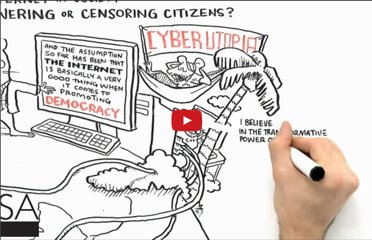Now that I've indulged my love of a good conspiracy theory, I'll move on... to awesome videos from Youtube!
In this video from the thersa.org's 'RSA Animate' Youtube channel, Evgeny Morozov explains (in audio taken from one of his 2009 lectures) the cyber-utopian view of the internet and why, in his opinion, this view is a very 'naive' one (2011). It explains many complex concepts in an easy and (let's be honest) fun form.
Who doesn't want to see world politics played out by cats and mice, am I right?
But seriously though, in the video - for those who can't be bothered watching the whole thing, I know it's almost 11mins long and I don't judge, I'm sure you're all fantastically busy people - Morozov discusses the Iranian government and specifically (around the 7min mark if you want to skip straight to it) the dangers social networking sites like Facebook pose to the protesters (2011).
He makes a good point towards the end about younger digital generations and the cyber-utopian assumption that they will naturally engage in activism and adhere to the "democratic values" of their predecessors, suggesting that realistically younger digital generations are more likely to heavily involve themselves in the entertainment side of the internet rather than cyber-activism (2011).
I see his point and I'm even guilty of this political apathy (or 'Slacktivism' as mentioned in Dimity's post: Level 9 Cyberspace Victory) myself at times. But I think he leans a little to heavily on the pessimism here. This maybe true of the younger digital generations in countries not experiencing civil unrest but what of the countries that are? Surely a high percentage of the younger digital generations in those countries that are involved in civil violence, who are brought up in a politically oppressive environments become engaged in protest/political activities? Is that an ignorant western assumption on my part? Perhaps.
So now we move onto video number two, which is not quite as fun but is no less important. Evgeny Morozov talks cyber-utopianism to 'The Stream'. A great example of not only the debate but also how the program itself is encouraging engagement via Google Plus forums, Twitter hashtags etc.
Ok, so at 15mins it's a bit longer but it mentions much of what was talked about in the lectures and tutorials, for example, Tunisia and the Sidi Bouzid incident - a street vendor that set him self on fire sparking nationwide protest (The Stream 2011). Also it's hilarious to see how animated everyone gets debating the subject.
This video really helped me to better understand Morozov's theory. I had originally mistakenly thought that cyber-realism was being presented as a dystopian view of the internet but it's not that at all. Morozov's theory of cyber realism is about a balanced and objective view of the internet and social media's influence on political revolution over the black and white, good vs bad, cyber-utopian vs cyber-dystopian approach to the effect of digital technologies.
This video really helped me to better understand Morozov's theory. I had originally mistakenly thought that cyber-realism was being presented as a dystopian view of the internet but it's not that at all. Morozov's theory of cyber realism is about a balanced and objective view of the internet and social media's influence on political revolution over the black and white, good vs bad, cyber-utopian vs cyber-dystopian approach to the effect of digital technologies.
Of Cyber-Skeptics and Cyber-Utopians – Debunking Myths and Discussing the Future: READ this article, if only for the of so appropriate quote at the end which sums up how I'm starting to feel about the whole issue.
It is probably time to stop overstating the evils of technology and begin constructive conversation about the road ahead for a leaderless revolution. Even the cyber-skeptic/cyber-utopian trope is unhelpful to the field as it allows thinkers to pigeon-hole one another and discredit each other’s arguments with buzzwords. Cyber-skepticism, moderate support or illusions of cyber-utopians will not decide the future of Egypt. Just like its revolution, it will be decided and carried forward by its people.
- Nikila Srinivasan, 2011.
How-To, opinion article. Pretty self exploratory.
The Political Power of Social Media: Essay on social media's effect on modern protesting. I haven't had a chance to read all of it yet (it's nine pages long) but it discusses Morozov, China, Iran, protest before and after social media, censorship and so on.
From Slactivism to Activism: Participatory Culture in the Age of Social Media.: Twitter, Facebook Slacktivism, txt messaging earthquake relief donations vs colouring your profile picture to support Iranian democracy - another good source.
Digiactive: A World of Digital Activists. Cyber activist resources.
Blog Resources:
"Cyber realism versus Cyber-utopians" 2011, The Stream, Aljazeera, accessed 10/10/2011 http://www.youtube.com/watch?v=q2-INCZx_KM&feature=player_embedded#! )
thersa.org, 2011, RSA Animate - The Internet in Society: Empowering or Censoring Citizens? accessed 10/10/2011
http://www.youtube.com/watch?v=Uk8x3V-sUgU&feature=player_embedded






